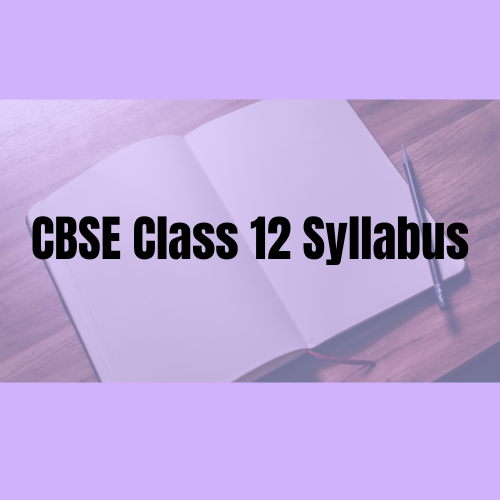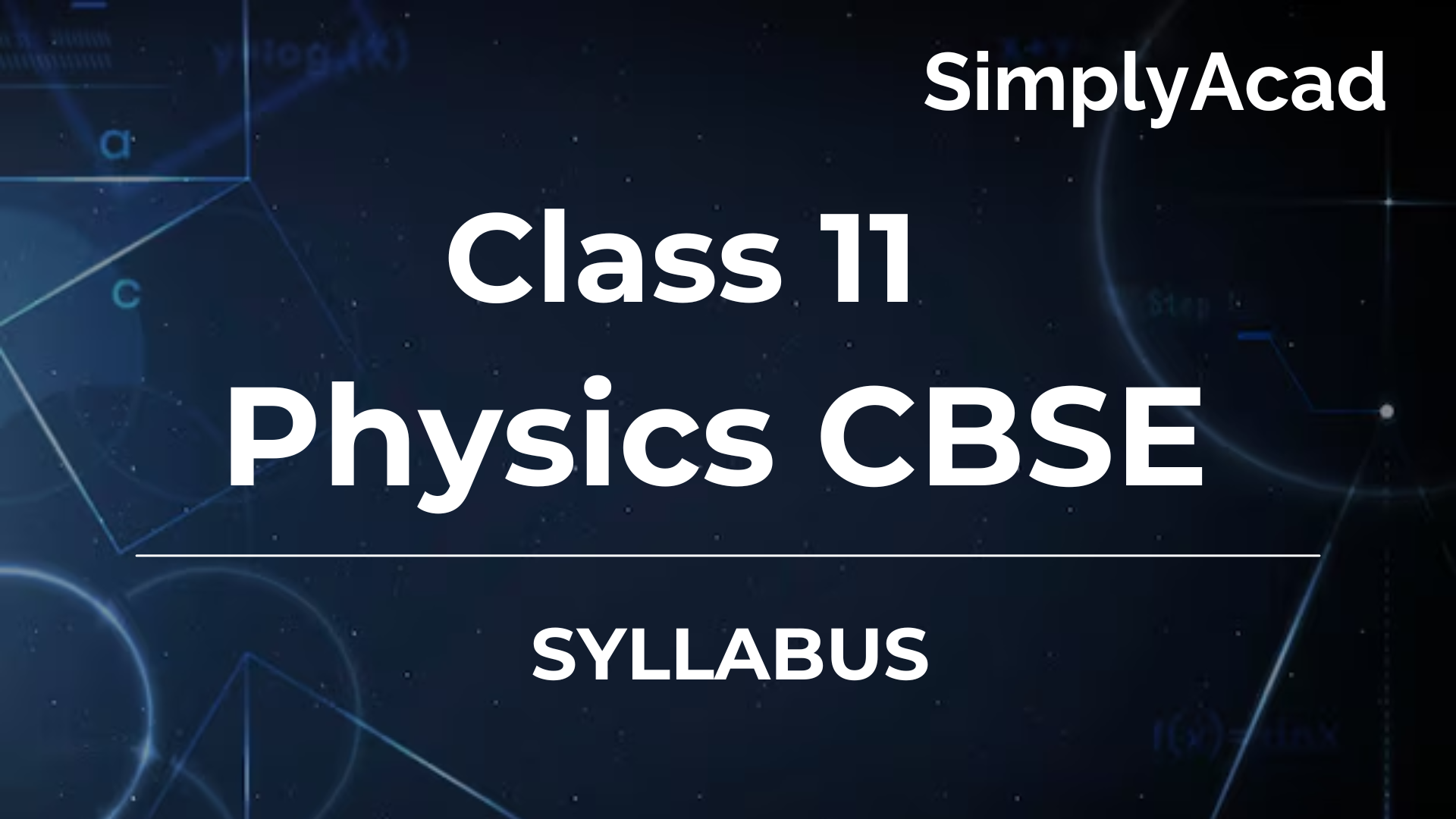CBSE Syllabus for Class 12 | 2024-25 Syllabus
CBSE Syllabus for Class 12 Detailed Syllabus
CBSE class 12 syllabus has been designed for you as a guide to help you establish the understanding of what concepts to learn and which areas of those topics are of extreme importance.
Understanding the core of the subject is an essential task every student must do. It can give you an edge over the students having the same questions and lengthy topics to study. Through this CBSE Syllabus for Class 12, you can make ideas about how to approach every chapter diligently. So do your smart work instead of just digging right into the first chapter of your textbook.

Subject Wise CBSE class 12 syllabus
Scroll below to access the whole CBSE Syllabus for Class 12 with updated curriculum in accordance with the latest academic year 2024-25. The units of each chapter are explained briefly to help you get an idea of what exactly you are going to prepare for, this will help to score best marks in your board examinations.
| SUBJECTS: CBSE Syllabus | |
| Class 12 Maths | |
| Class 12 Physics | |
| Class 12 Chemistry | |
| Class 12 Biology | |
| Class 12 English | |
| Class 12 Business Studies | |
| Class 12 Accountancy | Part 1
Part 2 |
| Class 12 Economics | Microeconomics
Macroeconomics |
| Class 12 Computer Science | |
CBSE Syllabus for Class 12 Maths
| CBSE Class 12 syllabus 2024-25 for Maths | |
| No. | Units |
| I. | Relations and Functions |
| II. | Algebra |
| III. | Calculus |
| IV. | Vectors and Three – Dimensional Geometry |
| V. | Linear Programming |
| VI. | Probability |
CBSE Class 12 Maths Question Paper Pattern 2024-25
| Section | Type of Questions | Number of Questions | Marks per Question | Total Marks |
| Section A | MCQ and Assertion-Reason Based | 20 (18 MCQs and 2 Assertion-Reason Based) | 1 | 20 |
| Section B | Very Short Answer Type | 5 | 2 | 10 |
| Section C | Short Answer Type | 6 | 3 | 18 |
| Section D | Long Answer Type | 4 | 5 | 20 |
| Section E | Source-based/Case-based/Passage-based | 3 | 4 | 12 |
Physics syllabus CBSE Class 12
| CBSE Class 12 syllabus 2024-25 for Physics | |
| Unit Name | Chapter Name |
| Electrostatics | Electric Charges and Fields |
| Electrostatic Potential and Capacitance | |
| Current Electricity | Current Electricity |
| Magnetic Effects of Current and Magnetism | Moving Charges and Magnetism |
| Magnetism and Matter | |
| Electromagnetic Induction and Alternating Currents | Electromagnetic Induction |
| Alternating currents | |
| Electromagnetic Waves | Electromagnetic Waves |
| Optics | Ray Optics and Optical Instruments |
| Wave Optics | |
| Dual Nature of Radiation and Matter | Dual Nature of Radiation and Matter |
| Atoms and Nuclei | Atoms |
| Nuclei | |
| Electronic Devices | Semiconductor -Electronics: Materials, Devices and Simple Circuits |
Physics Question Paper Pattern 2024-25
| Section | Type of Questions | Number of Questions | Marks per Question | Total Marks |
| Section A | MCQs | 18 | 1 | 18 |
| Section B | Short Answer Type | 7 | 2 | 14 |
| Section C | Short Answer Type | 5 | 3 | 15 |
| Section D | Long Answer Type | 3 | 5 | 15 |
| Section E | Case-Study Based | 2 | 4 | 8 |
CBSE Syllabus for Class 12 Physics Practical Marking Scheme
| Particulars | Marks |
| Two experiments one from each section | 7+7 |
| Practical record (experiments and activities) | 5 |
| One activity from any section | 3 |
| Investigatory Project | 3 |
| Viva on experiments, activities, and project | 5 |
CBSE Class 12 syllabus Chemistry
| Chemistry Class 12 Syllabus 2024-25 | ||
|---|---|---|
| Unit | Topics | Subtopics |
| 1 |
Solutions |
|
| 2 |
Electrochemistry |
|
| 3 |
Chemical Kinetics |
|
| 4 |
d and f Block Elements |
|
| 5 |
Coordination Compounds |
|
| 6 |
Haloalkanes and Haloarenes |
|
7 |
Alcohols, Phenols and Ethers |
|
| 8 |
Aldehydes, Ketones and Carboxylic Acids |
|
| 9 |
Amines |
|
| 10 |
Biomolecules |
|
Chemistry Question Paper Pattern 2024-25
| Section | Type of Questions | Number of Questions | Marks per Question | Total Marks |
| Section A | MCQ | 18 | 1 | 18 |
| Section B | Very Short Answer Type | 7 | 2 | 14 |
| Section C | Short Answer Type | 5 | 3 | 15 |
| Section D | Case-based Questions | 2 | 4 | 8 |
| Section E | Long Answer Type | 3 | 5 | 15 |
CBSE Class 12 Chemistry Practical Marking Scheme
| Evaluation Scheme | Marks |
| Volumetric Analysis | 8 |
| Salt Analysis | 8 |
| Content-Based Experiment | 6 |
| Project Work | 4 |
| Class Record and VIVA | 4 |
CBSE Syllabus for Class 12 Biology
| Unit Name | Chapters |
| Unit-VI Reproduction | Chapter-1: Sexual Reproduction in Flowering Plants
Chapter-2: Human Reproduction Chapter-3: Reproductive Health |
| Unit-VII Genetics and Evolution | Chapter-4: Principles of Inheritance and Variation
Chapter-5: Molecular Basis of Inheritance Chapter-6: Evolution |
| Unit-VIII Biology and Human Welfare | Chapter-7: Human Health and Diseases
Chapter-8: Microbes in Human Welfare |
| Unit-IX Biotechnology and its Applications | Chapter-9: Biotechnology – Principles and Processes
Chapter-10: Biotechnology and its Applications |
| Unit-X Ecology and Environment | Chapter-11: Organisms and Populations
Chapter-12: Ecosystem Chapter-13: Biodiversity and Its Conservation |
Biology Question Paper Pattern 2024-25
| Section | Type of Questions | Number of Questions | Marks per Question | Total Marks |
| Section A | MCQ | 16 | 1 | 16 |
| Section B | Very Short Answer Type | 5 | 2 | 10 |
| Section C | Short Answer Type | 7 | 3 | 21 |
| Section D | Case-based Questions | 2 | 4 | 8 |
| Section E | Long Answer Type | 3 | 5 | 15 |
Biology Practical Marking Scheme
| Evaluation Scheme | Marks |
| One Major Experiment | 5 |
| One Minor Experiment | 4 |
| Slide Preparation | 5 |
| Spotting | 7 |
| Practical Record + Viva Voce | 4 |
| Investigatory Project and its Project Record + Viva Voce | 5 |
Business Studies syllabus CBSE Class 12
| CBSE Class 12 syllabus 2024-25 for Business Studies | |
| Units | Chapters |
| Part A
Principles and Functions of Management |
|
|---|---|
| Nature and Significance of Management | |
| Principles of Management | |
| Business Environment | |
| Planning | |
| Organising | |
| Staffing | |
| Directing | |
| Controlling | |
| Business Finance and Marketing | |
| Part B | Business Finance and Marketing |
| Financial Management | |
| Financial Markets | |
| Marketing Management | |
| Consumer Protection | |
| Part C | Project Work |
Business Studies Question Paper Pattern 2024-25
| Type of Questions | Number of Questions | Total Marks |
| 1 Mark Question | 20 | 20 |
| 3 Marks Questions | 4 | 12 |
| 4 Marks Questions | 6 | 24 |
| 6 Marks Questions | 4 | 24 |
Accountancy syllabus CBSE Class 12
| CBSE Class 12 syllabus 2024-25 for Accountancy |
| Units |
| Part A: Accounting for Partnership Firms and Companies |
| Accounting for Partnership Firms |
| Accounting for Companies |
| Part B: Financial Statement Analysis |
| Analysis of Financial Statements |
| Cash Flow Statement |
| Project Work |
Accountancy Question Paper Pattern 2024-25
| Type of Questions | Question Numbers |
| 1 Mark Questions | Ques. 1 to 16, 27, and 30 |
| 3 Mark Questions | Ques. 17 to 20, 31, and 32 |
| 4 Mark Questions | Ques. 21, 22, and 33 |
| 6 Mark Questions | Ques. 23 to 26, and 34 |
History syllabus CBSE Class 12
| Part | Theme |
| Themes in Indian History Part I
Bricks, Beads, and Bones: The Harappa Civilisation |
|
|---|---|
| Kings, Farmers, and Towns: Early States and Economies (c.600 BCE 600 CE) | |
| Kingship, Caste and Class: Early Societies (c. 600 BCE 600 CE) | |
| Thinkers, Beliefs and Buildings: Cultural Developments (c. 600 BCE 600 CE) | |
| Themes in Indian History Part II
Through the Eyes of Travellers: Perceptions of Society (c. tenth to seventeenth centuries) |
|
| Bhakti-Sufi Traditions: Changes in Religious Beliefs and Devotional Texts (c. eighth to eighteenth centuries) | |
| An Imperial Capital – Vijayanagar (c. fourteenth to sixteenth centuries) | |
| Peasants, Zamindars and the States: Agrarian Society and the Mughal Empire (c. sixteenth-seventeenth centuries) | |
| Themes in Indian History Part III
Colonialism and The Countryside: Exploring Official Archives |
|
| Rebels and Raj: 1857 Revolt and its Representations | |
| Mahatma Gandhi and the National Movement: Civil Disobedience and Beyond | |
| Framing of the Constitution: The Beginning of a New Era | |
| Map Work | |
History Question Paper Pattern 2024-25
| Section | Type of Questions | Question Numbers | Marks per Question |
| Section A | MCQs | Ques. 1 to 21 | 01 |
| Section B | Short Answer Type | Ques. 22 to 27 | 03 |
| Section C | Long Answer Type | Ques. 28 to 30 | 08 |
| Section D | Source-Based Questions | Ques. 31 to 33 | 04 |
| Section E | Map-Based | Ques. 34 | 05 |
Political Science syllabus CBSE Class 12
| CBSE Class 12 syllabus 2024-25 for Political Science |
| Units |
| Part A: Contemporary World Politics |
| The End of Bipolarity |
| Contemporary Centres of Power |
| Contemporary South Asia |
| International Organizations |
| Security in the Contemporary World |
| Environment and Natural Resources |
| Globalisation |
| Part B: Politics in India Since Independence |
| Challenges of Nation-Building |
| Era of One-Party Dominance |
| Politics of Planned Development |
| India’s External Relationship |
| Challenges to the restoration of the Congress system |
| The Crisis of Democratic Order |
| Regional Aspirations |
| Recent Development in Indian Politics: |
Political Science Syllabus
| Types of Questions | Number of Question | Marks per Question | Total Marks |
| Objective/MCQ | 12 | 1 | 12 |
| Short Answer Type I | 6 | 2 | 12 |
| Short Answer Type II | 5 | 4 | 20 |
| Passage/Map/Cartoon-based Questions | 3 | 4 | 12 |
| Long Answer Type | 4 | 6 | 24 |
Geography syllabus CBSE Class 12
| Chapter |
| Human Geography |
| The World Population – Distribution, Density, and Growth |
| Human Development |
| Primary Activities |
| Secondary Activities |
| Tertiary and Quaternary Activities |
| Transport and Communication |
| International Trade |
| Map Work |
Geography Question Paper Pattern 2024-25
| Type of Questions | Number of Questions | Marks per Question | Total Marks |
| MCQs | 17 | 1 | 17 |
| Very Short Answer | 2 | 3 | 06 |
| Short Answer Type | 4 | 3 | 12 |
| Long Answer Type | 5 | 5 | 25 |
| Map-Based Question | 2 | 5 | 10 |
Economics Syllabus CBSE Class 12
| CBSE Class 12 syllabus 2024-25 for Economics |
| Part A: Introductory Macroeconomics |
| National Income and Related Aggregates |
| Money and Banking |
| Determination of Income and Employment |
| Government Budget and the Economy |
| Balance of Payments |
| Part B: Indian Economic Development |
| Development Experience (1947-90) and Economic Reforms since 1991 |
| Current Challenges facing Indian Economy |
| Development Experience of India – A Comparison with Neighbours |
| Theory Paper |
Economics Question Paper Pattern CBSE Class 12 2024-25
| Type of Questions | Number of Questions | Marks per Question | Total Marks |
| MCQs | 20 | 1 | 20 |
| Short Answer Questions | 4 | 3 | 12 |
| Short Answer Questions | 6 | 4 | 24 |
| Long Answer Questions | 4 | 6 | 24 |
CBSE Class 12 syllabus English Core
| Flamingo | Vistas
Grammar Reading Comprehension |
||||
|---|---|---|---|---|---|
| Prose | Poem | ||||
| The Last Lesson | My Mother at Sixty-Six | The Third Level | 1.Short Writing Tasks:
Notice Formal/Informal Invitation and Reply |
1. Unseen passage (factual, descriptive or literary) | |
| Lost Spring | Keeping Quiet | The Tiger King | 2.Long Writing Tasks:
Letters Writing – For a job with bio-data or resume Letters to the editor Article/ Report Writing |
2. Case-Based Unseen | |
| Deep Water | A Thing of Beauty | Journey to the End of the Earth | |||
| The Rattrap | A Roadside Stand | The Enemy | |||
| Indigo | Aunt Jennifer’s Tigers | On the Face of It Memories of Childhood | |||
| Poets and Pancakes | The Cutting of My Long Hair | ||||
| The Interview | We Too are Human Beings | ||||
| Going Places | |||||
Marks Disribution
| Section | Topics | Marks |
| Reading Section | 2 Unseen passages (one may be factual, literary, or descriptive, and the other will be case-based) | 22 Marks |
| Writing | Notice, formal and informal invitations, letters, article, report writing | 18 Marks |
| Literature | MCQs, objective, short, and long answer type questions from both textbooks: Flamingo and Vistas | 40 Marks |
Frequently Asked Questions on CBSE Class 12 Syllabus
Q1. Which subjects should be given prior attention from an exam point of view?
Ans.: The subjects including Physics, Mathematics, Chemistry and Biology for the science students and Accountancy, Business Studies for commerce students must be given extra attention.
Q2. Do we need to study the overall syllabus for the board examinations?
Ans.: To score well in board examinations you need to understand the requirements of each subject. Students can refer to the provided syllabus to get a brief idea and work accordingly.
Q3. Do we need to study anything outside the syllabus?
Ans. CBSE has constructed a structured syllabus for Class 12 students to provide them with enough knowledge. However, students willing to learn more about certain topics can look outside their syllabus.
latest video
news via inbox
Nulla turp dis cursus. Integer liberos euismod pretium faucibua



